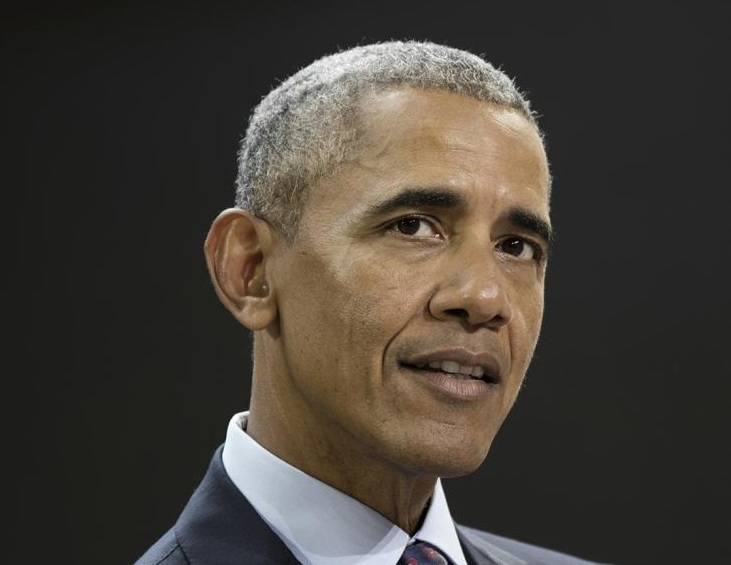來(lái)源于《美國(guó)》版塊
Barack Obama, Stacey Abrams, John Kerry and Irshad Manji on How to Make America Great—Finally
訪(fǎng)談巴拉克·奧巴馬、斯泰西·艾布拉姆斯、約翰·克里、伊莎德·曼吉關(guān)于如何讓美國(guó)變得強(qiáng)大——終稿
BY MARY KAYE SCHILLING, NICOLE GOODKIND, ANNA MENTA, NINA BURLEIGH AND JANICE WILLIAMS
作者:瑪麗·凱、妮可·古肯德、安娜·門(mén)塔、妮娜·布雷和賈尼斯·威廉姆斯
Mass shootings, #MeToo, family separation, climate change, impeachment. The world is dark and getting darker. Or at least that’s what it seems like from the relentless barrage of push alerts and Facebook posts blowing up our phones. In turn, we get angry, we despair, we withdraw. It’s a vicious cycle, with seemingly no reprieve.
大規(guī)模槍擊事件、“我也是”運(yùn)動(dòng)、骨肉分離、氣候變化、彈劾。世界越來(lái)越黑暗。或者至少?gòu)耐扑吞嵝押筒粩嗤扑偷绞謾C(jī)的Facebook帖子來(lái)看是這樣。所以我們生氣、絕望、退縮。這是一個(gè)惡性循環(huán),似乎沒(méi)有喘息的機(jī)會(huì)。
“We in the media—because of our own need for eyeballs and clicks and profits—we’re not telling the healing stories,” says author Irshad Manji, who is among the people Newsweek spoke to about how to move beyond fear and begin to fix our nation’s problems. “We’re telling the stories of the conflicts. We need to hear both.”
《新聞周刊》采訪(fǎng)了一些人,談到如何超越恐懼,著手解決我們國(guó)家的問(wèn)題。“我們出現(xiàn)在媒體中,是因?yàn)槲覀冏约盒枰P(guān)注、點(diǎn)擊率和利潤(rùn)——我們不是在講雞湯文,”作家伊莎德·曼吉如此表示。“我們?cè)谥v述沖突的故事。兩者都需要聽(tīng)聽(tīng)。”
BY BARACK OBAMA
巴拉克·奧巴馬
Robert F. Kennedy knew a thing or two about hope. Half a century ago, it was hope in the future, hope in people, hope in our capacity to do better, to be better, that spurred him to challenge a sitting president of his own party and challenge the conscience of a nation.
羅伯特·F·肯尼迪對(duì)希望略知一二。半個(gè)世紀(jì)以前,正是對(duì)未來(lái)的希望,對(duì)人民的希望,對(duì)我們做得更好、做得更好的能力的希望,激勵(lì)他挑戰(zhàn)自己政黨的現(xiàn)任總統(tǒng),挑戰(zhàn)一個(gè)民族的良知。
And through steel towns and crowded housing projects and windswept Native American reservations, Bobby reinvigorated an American spirit that was bruised and battered and still reeling from assassinations and riots and protests—and hatred. And he had ambition, and he had moral clarity. He argued for unity over division, for compassion over mutual suspicion, for justice over intolerance and inequality. And standing on some makeshift platform, maybe on the trunk of a convertible or the back of a flatbed, sometimes speaking into a tiny microphone while an aide held up a portable speaker, he felt authentic, and he felt true, not stage-managed or prepackaged like so many people in public life.
穿過(guò)鋼鐵城鎮(zhèn)、擁擠的住宅區(qū)和狂風(fēng)肆虐的印第安人保留地,鮑比重振了美國(guó)精神,這種精神曾經(jīng)傷痕累累、飽受摧殘,但仍然受到暗殺、暴亂、抗議和仇恨的摧殘。他有抱負(fù),有清晰的道德標(biāo)準(zhǔn)。他主張團(tuán)結(jié)而不是分裂,同情而不是相互猜疑,正義而不是偏執(zhí)和不平等。他有時(shí)站在臨時(shí)搭建的平臺(tái)上,可能是敞篷汽車(chē)的后備箱上,也可能是平板汽車(chē)的后座上,讓助手拿著便攜式揚(yáng)聲器,對(duì)著微型麥克風(fēng)講話(huà),他覺(jué)得自己是真實(shí)的,而非像公眾生活中的許多人那樣,在舞臺(tái)上表演或預(yù)先包裝。

Which is why when you look at the photos and you look at the footage of that remarkable period, what sticks out is the sea of hands surrounding him seemingly everywhere he went. Dozens of hands, hundreds of hands, thousands, every shape and every color, the smooth hands of children and the wrinkled, worn hands of the elderly, and they’re all reaching upward.
這就是為什么當(dāng)你看這些照片和那段非凡時(shí)期的錄像時(shí),你會(huì)發(fā)現(xiàn),他走到哪里,周?chē)际且黄值暮Q蟆资皇郑瑤装僦皇郑瑤浊е皇郑鞣N形狀,各種顏色,孩子們光滑的手,老人布滿(mǎn)皺紋的手,都向上伸著。
He understood that it wasn’t blind optimism that he was peddling. Hope is never a willful ignorance to the hardships and cruelties that so many suffer or the enormous challenges that we face in mounting progress in this imperfect world…. [It’s] a belief in goodness and human ingenuity and, maybe most of all, our ability to connect with each other and see each other in ourselves, and that if we summon our best selves, then maybe we can inspire others to do the same.
他明白他兜售的不是盲目的樂(lè)觀主義。希望絕不是讓如此多的人遭受苦難和殘酷,也絕不是故意忽視我們?cè)谶@個(gè)不完美的世界中不斷進(jìn)步所面臨的巨大挑戰(zhàn)。它是對(duì)善良和人類(lèi)智慧的信仰,也許最重要的是,我們相互聯(lián)系的能力,看到我們自己的能力,如果我們能找回最好的自己,也許我們能激勵(lì)其他人也這么做。
譯文由可可原創(chuàng),僅供學(xué)習(xí)交流使用,未經(jīng)許可請(qǐng)勿轉(zhuǎn)載。












